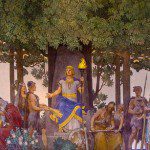A new face shows up in the message boards, “where should I begin?” they inquire. It is rather painfully true that Hellenism has a dearth of “starter” material available, and what is available is often written by people who think they have the one “true” iteration of Hellenism. So most people just list primary and secondary resources with a sentence or two about them, which is good but perhaps not sufficient. Shifting to a polytheistic theology takes more than just reading a couple of books; it helps to learn about models which have persisted into the modern world too. So here is my slightly different “starter” books, two for historical background and two for just starting to foment a new perspective.

Harvard University Press / Harvard University Press
The University of North Carolina Press / Simon and Schuster
Walter Burket, Greek Religion
Greek Religion is considered by many to be Burkert’s magnum opus, providing a detailed interpretation of the available archaeological data at the time. Greek Religion is an ambitious work. Beginning with the roots of the cultic practices as they emerged during the Mycenaean period and going to the end of the Classical age, Burkert provides a holistic look at the religious practices of the ancient Greeks. He examines major festivals, types of offerings, deities and how perceptions changed over time (as well as a cautious etymology for some names), and even a view of how philosophical schools interacted with and changed public perceptions of the gods and what we would call “religion.”
Burkert’s work is by no means perfect. He was not a polytheist himself. He was an academic and his interpretations of data are done to support the theories of ritual sacrifice that he put forward (as discussed and outlined in his work Homo Necans). So one must keep in mind these facts when reading his interpretations and explanations of data. His work, of course, tends to also be quite dry. Bearing these in mind will allow one to read one of the most important works available to modern day Hellenists and develop a broad historical background.
Paige duBois, A Million and One Gods: The Persistence of Polytheism
A Million and One Gods provides a brilliant examination of both how polytheism and polytheistic ideas have survived in the West and how they persist in even the Abrahamic faiths as well as a reasonable defense for polytheism. Part of her argument is based upon the tolerance that polytheistic faiths typically allow for and how this may be better suited for today’s pluralistic and multicultural societies. Her argument is sound, well-formed, and interesting and I recommend this book to everybody–polytheist and monotheist alike–it can provide a great foundation for getting rid of some monotheistic baggage.
Most importantly, the book makes a great case for the importance of polytheism and can give one hope for the long term viability of polytheism in today’s society. While it likely won’t directly inform any sort of practice, it will definitely expand your intellectual horizons regardless of theological position.
Jon D. Mikalson, Athenian Popular Religion
It is unfortunately true that much of what we know about ancient Greek theological concepts are those presented to us in the works of various philosophers, especially Plato. Thus the average citizen is viewed by some as a theological non-entity, an individual who offers to the gods but gives little thought to the machinations or nature of the deities. Unfortunately due to this dearth many folks have insisted that developing Western polytheistic schools of theology is completely unimportant due to the unimportance in ancient days. Mikalson’s work shows us just the contrary. While the average person was by no means a theologian, his work Athenian Popular Religion deftly demonstrates that ideas the average citizen had about the gods, the afterlife, and the ancestors had a profound effect upon their lives. At times these ideas would soothe their anxieties, at times they would heighten them especially in regards to what lies beyond the veil of this life.
The modern practitioner will be able to discern some important cultic concepts, this is true, but most importantly they will be able to determine for themselves how important developing these concepts and what makes the most sense to believe and practice in a modern setting as informed by the historical setting.
Sokyo Ono, Shinto: The Kami Way
Many Western polytheists carry around a lot of strange, dangerous, or contradictory concepts about how they should engage in their tradition and carry on with being a polytheist because of the lack of role models in our Protestant Christian society. While I am hesitant to refer to Shinto as polytheistic (kami, from what I have read and studied, are divine beings of degrees of power; calling them gods isn’t exactly a great translation). Many of the practices in the ethnoreligious tradition will be extremely familiar to most Western polytheists. For those of us engaging in reconstructionist efforts this short examination can be vitally useful in helping us determine what is worth reconstructing and what may be better left in the museums.
Sokyo Ono explains basic concepts in Shinto: the Kami Way such as shrines, worship styles, festivals theological concepts, and even how Shinto has interacted with Japan’s political and social climate over the years. This work is a true treasure for the Western polytheist and can really help us identify areas that may be problematic for us and ways in which we can remedy them. More importantly you get to learn about a really cool, ancient, and continuous tradition that has survived interactions with both Buddhist and Christian missionaries.
Things to Remember
- It is helpful to remember, as Rabbi Mordecai Kaplan put it “the past has a vote, not a veto.” Just because something was or was not done in a particular way in ancient times doesn’t mean that you must do or not do it that way. Think about things critically and make your decisions carefully.
- Be patient. A lot of this material can be difficult for some individuals to process and even exceptionally intelligent people have to chew on this information to properly apply it. You may wind up reading a book two or three times. Personally, I make an effort to read the books I listed once a year. Rereading, while it can be tedious, can be immensely helpful and yield new insights.
- Synthesize information. Don’t simply say to yourself “well Burkert said …” read as many books as you can get your hands on and synthesize the information for your conclusions. It’ll help you and those you discuss praxis and theology with get an even better handle on concepts.
- Amidst your reading don’t forget to practice. Reading and getting a grasp on how all of this stuff works is pretty important but you cannot replace doing with studying. Part of being in a living tradition is well … living! Experience the gods and spirits and use that knowledge in conjunction with what you’ve been studying and you will do well.

Patheos Pagan on Facebook.

the Agora on Facebook
Spear of Athena is posted on alternate Thursdays here at the Agora. Subscribe by RSS or e-mail!
Please use the links to the right to keep on top of activities here on the Agora as well as across the entire Patheos Pagan channel.

















